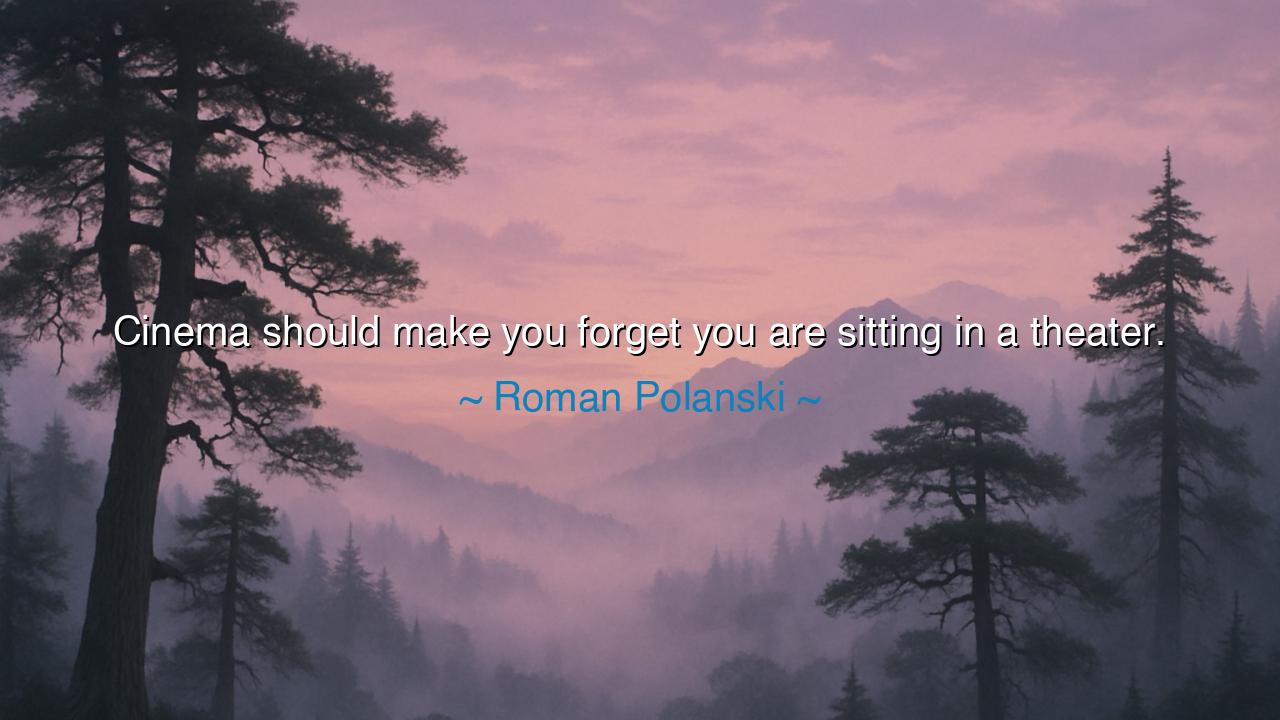
Cinema should make you forget you are sitting in a theater.






Hear the words of Roman Polanski, a craftsman of the screen and student of the human soul: “Cinema should make you forget you are sitting in a theater.” In this utterance lies the true purpose of the moving image—that it should transport, transform, and carry the watcher beyond the boundaries of walls, beyond the seat, beyond even the self. For the power of great art is not merely to be looked upon, but to absorb the beholder into its world until all else is forgotten.
The theater is but a vessel, a container of wood, of velvet seats, of glowing lamps. But when the film achieves greatness, those trappings vanish. The watcher no longer sees curtains or ceilings, no longer hears the shuffle of feet beside them. Instead, they are upon the battlefield, standing with soldiers; they are walking beneath alien stars; they are whispering with lovers in secret. This is the enchantment of cinema—to make the real world fall away like a discarded garment, so that the soul may wander free in another realm.
The ancients knew the power of such immersion. In Athens, the plays of Sophocles and Euripides were staged beneath the open sky, yet the audience forgot the stones upon which they sat. They were drawn into the grief of Oedipus, the torment of Medea, until the theater itself disappeared. The Romans, too, when the gladiators clashed, saw not merely men and sand, but the fate of empire reflected before them. It was not the place that mattered, but the transformation of mind and heart.
History gives us examples in modern times as well. When audiences first saw The Great Train Robbery in 1903, they gasped and ducked as a bandit fired his pistol toward the screen. In that moment, they forgot that they were safe in wooden chairs. The illusion was complete; the cinema had dissolved the boundaries of space. Later, when Chaplin made men laugh and weep with silent gestures, he too proved Polanski’s truth—that the greatest art is not confined to the theater, but carries the audience into another world.
Yet, O listener, there is a deeper lesson. Life itself is like a theater, filled with props and roles, with distractions and noise. But just as cinema can draw us out of the seat, so too can moments of wonder, love, or inspiration draw us out of the smallness of our daily stage. A sunset may make us forget the city behind us. A song may carry us beyond time. A conversation with a friend may dissolve the weight of the world. The principle is the same: immersion in beauty is the pathway to transcendence.
The lesson then is clear: seek experiences that draw you out of yourself. When you create, aim not only to entertain, but to absorb, to transform, to awaken. And when you live, do not remain bound to your “seat” in the theater of habit. Allow yourself to be carried away—by stories, by love, by awe, by compassion—until you forget where you are and remember instead who you truly are.
Therefore, O seeker, hold Polanski’s wisdom close: cinema—and by extension, all true art—exists not to remind us of our chairs and ceilings, but to let us soar beyond them. Do not settle for art that leaves you aware of the theater; crave that which makes the theater vanish. For in that forgetting, you awaken to a deeper remembering: that the soul was made not merely to sit, but to journey.
So remember: the highest calling of cinema and of life is transformation. When the walls of the theater fall away, when the self dissolves into the story, then the art has achieved its purpose. And when life itself grants you such moments, embrace them, for they are the glimpses of eternity hidden within time.






AAdministratorAdministrator
Welcome, honored guests. Please leave a comment, we will respond soon